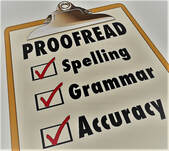|
Readers are taken aback when they spot a typo that seems careless or ridiculous to them. Sometimes it’s not habitual sloppiness or lack of effort leading to those errors. Instead, situations crop up where even meticulous writers or editors find it tough to catch mistakes. Updates Imagine that you want to rerun a seasonal sale announcement that has worked well the previous year. Most businesses simply find last year’s message and change the relevant dates. And then they forget to change the day of the week in the announcement, and even if they reread it before posting, they overlook the discrepancy. Every time you reuse and update previous copy, check it thoroughly. Make sure you’ve looked at every element that needs to be changed. Quick fixes Ever tinkered at the last moment with what you wrote? Before you post or send it? You make a small change and relax, not noticing that changing two words knock the rest of the sentence out of whack. This last-minute timing of fiddling makes it harder to spot errors that you would otherwise have seen. Here are two things I could help you with:
0 Comments
A staff manual, or at least written down procedures, can provide much-needed clarity. Step by step your staff can learn what to do when and how. When you employ a new staff member, they have the same instructions as everyone else, therefore quality standards and expectations are the same. If your employees are unsure about the next step; the why of a step; the overall picture of a task or process, they can look up the staff manual and find the answers there - most of the time without the need to bother you! Even if you only have five staff members, it pays to have certain processes written down. Think of it as the 'bus syndrome' - If you or your staff member gets run over by a bus, someone else needs to do the job, and if they don't know what to do, then what? When I create a staff manual I am in the person’s shoes. I do the task, then write it down, next step, write down, and so on. It makes me question some of the steps, it makes me think about the step, does it make sense, can it be made simpler, streamlined? Once the process is written down completely I let it sit and then look at it with fresh eyes. When I am satisfied I read and do the task according to the manual. That provides the chance to find little inconsistencies or hick-ups. Once I’m satisfied the manual is clear, I ask someone else to follow the steps and do the tasks, to see if it is understandable and makes sense. Here are three things I could help you with:
AI or HI? (Artificial Intelligence or Human Intelligence) By now we’ve all heard about AI and its growth in all aspects of our lives. Chatbots have the ability to retrieve and repackage information at speeds that are well beyond normal human capabilities, and digital assistance apps are set to revolutionise productivity in many workplaces and change the tech landscape. One of those apps, ChatGPT, is making writing much easier for the general population by assisting with tasks like composing daily emails up to higher-level tasks like composing essays. Some experts warn these tools are far from perfect. Although chatbots seem to answer any question confidently, they aren’t always correct and sometimes don’t include basic facts. Which leads to the question: what are the implications of AI apps for editing and proofreading? Research shows that AI tools are great for identifying potential issues. Human editors though have vastly superior capacities for making relevant style changes and explaining why they were necessary. Apps like Chat GPT can detect technical errors and inconsistencies, however, they can also tend to standardise the English language.
The human touch is needed to retain language diversity, tone, and style nuances and to avoid potentially embarrassing mistakes.
I am a human, you can contact me for your editing and proofreading needs! The secret to writing effective proposals, emails, and more :-) Being clear, concise, correct, and considerate is as important in the written word as it is in the spoken word. It’s helpful to keep the needs of your reader in mind. Here are some more tips for your business writing.  Adopt the "you attitude" Look at the topic from your reader’s point of view: Example: I have requested that your order be sent out today. Revision: You will receive your order by Wednesday. Focus on the real subject Don't bury a key word into a long sentence. Example: The implementation of the new marketing campaign will begin on April 1. Revision: The new marketing campaign will begin on April 1. Write actively, not passively Active voice is generally easier on the eye (and brain) than passive voice. Example: Your proposal was reviewed at our meeting on April 1, and it was immediately submitted to the developers. Revision: We reviewed your proposal on April 1 and immediately submitted it to the developers. Cut unnecessary words and phrases Example: I am writing this note because I want to thank you very much for organizing the open home that was held last Monday. Revision: Thank you very much for organizing last Monday’s open home. Don't forget your manners Saying thank you and please is not only considerate in conversation, but also in emails and letters. Example: Send me the jargon report before you head home. Revision: Please send me the jargon report before you head home. Don't leave out key words Sometimes it’s necessary to add some words, so we can be clear and concise. Example: The storage shed is the first step. Revision: Unlocking the storage shed is the first step. Put a cap on the vogue words and buzzwords Just sound like a human! Example: At the end of the day the bottom line is that we should facilitate opportunities for employees to provide input on best practices. Revision: Let's encourage people to make suggestions. Avoid outdated expressions Don’t use words and phrases you wouldn’t use in a conversation, i.e. “attached herewith," "this is to advise you," "as per your request." Example: Attached herewith for your reference is a duplicated version of the aforementioned deed. Revision: I have enclosed a copy of the deed.  Proofread Always check your work before hitting the send button. Example: When you're in a hurry, it's very easy to leave words. Revision: When you're in a hurry, it's very easy to leave out words. If you need help with any of these issues in your business life, then please Contact me now! Please avoid the following words and/or phrases:
1. alot Alot (one word) is a common misspelling of a lot (two words). "[W]e all may write alot one day," says The American Heritage Guide to Contemporary Usage (2005), but for now "keep in mind that alot is still considered an error in print." 2. and etc. Because the abbreviation etc. (from the Latin et cetera) means "and so on," and etc. is redundant. In any case, avoid using etc. in your essays: often it gives the impression that you simply can't think of anything else to add to a list. 3. anywheres Huckleberry Finn can get away with saying, "There warn't a sound anywheres," but on formal occasions drop the terminal s. If anywheres appears anywhere in your dictionary, it's probably labeled "nonstandard" or "dialectal." 4. could of (arrrrgh!) Don't confuse this nonstandard form with the contraction could've. Could of (along with should of and would of) can and should be replaced by could have (and should have and would have). 5. hisself This alternative form of the reflexive pronoun himself is commonly heard in certain dialects, but in formal writing steer clear of hisself (and theirself as well—though both were regarded as good usage in Middle and Early-Modern English). 6. furtherest The comparative form of far is farther or further. The superlative form is farthest or furthest. Nothing's gained by combining the two forms. 7. irregardless This double negative (ir- at the beginning and -less at the end) may not deserve Bryan Garner's label of "semiliterate . . . barbarism," but he's probably right that in print it "should have been stamped out long ago" (Garner's Modern American Usage, 2009). Use regardless instead. 8. its' Its is a possessive pronoun (like his or her). It's is a contraction of it is or it has. That leaves nothing for its' to do—so toss it. 9. let's us Let's us means "let us." To avoid repetition, write lets ("She lets us play in her yard"), let's ("Let's play in her yard"), or let us ("Let us pray"). 10. nohow If you have the know-how to write, you don't need to be told to avoid nohow. Instead, use in no way or not at all. So, do you use any of these? Contact me, if you need help with your writing! The goal of a copy-edit is to address flaws on a very technical level - to make sure the writing that appears on the page is in accordance with industry standards. It's like an incredibly high-end proofread. Read on for more details. A copy-edit
So, to make a sweeping and totally reductive generalisation, the job of a general editor is to help you tell a better story, and the job of a copy-editor is to make sure the grammar on every page is correct.  Contact me now to discuss your needs! Are you a good writer?
Some people are just great at writing, whether it is an email, a novel, or a business plan. If you are not the most confident writer, then read on. Here are some tips for you to help with your writing Some experts say that the font of your document should be Times New Roman, as that is easier to read when there is a lot of text. Font size should be 12 pt, and spacing between lines 1.5 Spellcheck - computer vs human After doing the computerized spellcheck, read again to see the things the computer doesn't know, i.e. the difference between ‘their', ‘there', and ‘they're'. Changes If you change a word at the last minute, make sure to read the whole sentence again, or even the paragraph, as it might be possible that you changed the intended meaning with just one word. Breathe Let your story breathe … Give it a break, then proofread it. This will allow you to view your writing with fresh eyes. Zoom In Zoom into the document to make the writing larger – DO NOT change the font size! That will change any formatting you had done previously or that you are doing now. Reading Read out loud – if it sounds weird, there is probably something wrong and needs to be changed. Also, you immerse yourself even more into your story and find subtle inconsistencies. Comma, semicolon, full stop
When you read out loud, you will hear those differences. Wear Out Your Dictionary Once you have a dictionary, use it as much as possible. When you sit down to write and need a particular word, pause to consider the key ideas you want to convey. Start with a word that's in the ballpark. Look it up and go from there, exploring synonyms, roots, and usage notes. Be Patient With Your Writing If you can't find the right word for one sentence, check out the internet and see if you can find it. Even then, a word may be elusive, refusing to emerge from the mind one day only to arise from the subconscious the next. Be prepared to rewrite today what you revised yesterday. I hope these suggestions help you to be as confident in your writing as possible. You can also contact me if you need some help. With everything (or nearly everything) happening on social media these days, we might forget how to write formally. And with that, I don't mean old-fashioned kind of language but just generally using "real" words.
Read on for more details. 1. alot Alot (one word) is a common misspelling of a lot (two words). "[W]e all may write alot one day," says The American Heritage Guide to Contemporary Usage (2005), but for now "keep in mind that alot is still considered an error in print." 2. and etc. Because the abbreviation etc. (from the Latin et cetera) means "and so on," and etc. is redundant. In any case, avoid using etc. in your essays: often it gives the impression that you simply can't think of anything else to add to a list. 3. anywheres Huckleberry Finn can get away with saying, "There warn't a sound anywheres," but on formal occasions drop the terminal s. If anywheres appears anywhere in your dictionary, it's probably labeled "nonstandard" or "dialectal." 4. could of (arrrrgh!) Don't confuse this nonstandard form with the contraction could've. Could of (along with should of and would of) can and should be replaced by could have (and should have and would have). 5. hisself This alternative form of the reflexive pronoun himself is commonly heard in certain dialects, but in formal writing steer clear of hisself (and theirself as well—though both were regarded as good usage in Middle and Early-Modern English). 6. furtherest The comparative form of far is farther or further. The superlative form is farthest or furthest. Nothing's gained by combining the two forms. 7. irregardless This double negative (ir- at the beginning and -less at the end) may not deserve Bryan Garner's label of "semiliterate . . . barbarism," but he's probably right that in print it "should have been stamped out long ago" (Garner's Modern American Usage, 2009). Use regardless instead. 8. its' Its is a possessive pronoun (like his or her). It's is a contraction of it is or it has. That leaves nothing for its' to do—so toss it. 9. let's us Let's us means "let us." To avoid repetition, write lets ("She lets us play in her yard"), let's ("Let's play in her yard"), or let us ("Let us pray"). 10. nohow If you have the know-how to write, you don't need to be told to avoid nohow. Instead, use in no way or not at all. So, do you use any of these? Some people are just great at writing, whether it is an email, a novel, or a business plan.
If you are not the most confident writer, read on. Here are some tips for you to help with your writing Font size Some experts say that the font of your document should be Times New Roman, as that is easier to read when there is a lot of text. Font size should be 12 pt, and spacing between lines 1.5 Spellcheck - computer vs human After doing the computerized spellcheck, read again to see the things the computer doesn't know, i.e. the difference between ‘their', ‘there', and ‘they're'. Changes If you change a word at the last minute, make sure to read the whole sentence again, or even the paragraph, as it might be possible that you changed the intended meaning with just one word. Breathe Let your story breathe … Give it a break, then proofread it. This will allow you to view your writing with fresh eyes. Zoom In Zoom into the document to make the writing larger – DO NOT change the font size! That will change any formatting you had done previously or that you are doing now. Reading Read out loud – if it sounds weird, there is probably something wrong and needs to be changed. Also, you immerse yourself even more into your story and find subtle inconsistencies. Comma, semicolon, full stop
Wear Out Your Dictionary Once you have a dictionary, use it as much as possible. When you sit down to write and need a particular word, pause to consider the key ideas you want to convey. Start with a word that's in the ballpark. Look it up and go from there, exploring synonyms, roots, and usage notes. Be Patient With Your Writing If you can't find the right word for one sentence, check out the internet and see if you can find it. Even then, a word may be elusive, refusing to emerge from the mind one day only to arise from the subconscious the next. Be prepared to rewrite today what you revised yesterday. I hope these suggestions help you to be as confident in your writing as possible. An Example of Line-Editing and Copy-Editing on the same original passage Original: "The rising light of the sun was quickly brightening. Dawn was turning into morning. Alex finished reading her copy of the "New York Times" and put the paper down on the table, and then grabbed her ipod and put on Beyoncé's Crazy in Love and went out for her mourning run." The result after a line-editor has helped the author to rework it so that it reads more fluidly: "The dawn light brightened, giving way to morning. Alex tossed the "New York Times" onto the table, grabbed her ipod, and then put on Beyoncé's Crazy in Love as she headed out for her morning run." Notice, the line-editor caught and fixed a couple of technical errors, i.e. the typo on the second use of "morning". The result after the passage has been copy-edited for grammar and usage: "The dawn light brightened, giving way to morning. Alex tossed the New York Times onto the table, grabbed her iPod, and put on Beyoncé's "Crazy in Love" as she headed out for her morning run." The order in which editing and proofreading should be done:
If you need help with any of these, contact me :)
|
Details
AuthorHi, I am Marion of Marion Metz Solutions Archives
July 2024
Categories
All
|
Find the Terms and Conditions and the Privacy Policy for this website here



 RSS Feed
RSS Feed

